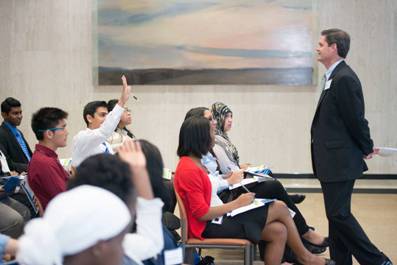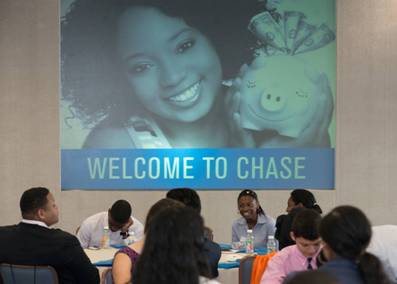One Bank’s Way of Promoting Financial Education Through Summer Employment
Between May and September, many high school and college students work at summer jobs and for the first time experience what it is like to earn income and make financial decisions. Given that financial habits (both good and bad) can start early in life, summer employment programs provide an opportunity for financial educators to work with others in their community and the FDIC’s Money Smart program to help young people learn about money and perhaps even open a bank account.
One example is a program announced in June 2014 by JPMorgan Chase. The firm committed $5 million over the next two years to U.S. summer youth employment initiatives that will provide paid jobs to over 4,000 teenagers and young adults in 14 cities, primarily from low-income families. Chase’s funding also will provide learning opportunities for 20,000 13- to 24-year olds in the fields of science, technology, engineering, arts and math.
Chase employees also hosted financial management seminars for some of the students participating in the summer youth programs. As part of the preparations, more than 25 Chase employees in New York attended an FDIC-hosted Money Smart webinar to learn about the curriculum, its format, and how to present it. Rodney Hood, National Partnerships Manager for JPMorgan Chase’s Office of Nonprofit Engagement, said, “As many of these students are earning a paycheck for the first time, we thought it was important to create these sessions to provide valuable advice on how to manage their money. Using the Money Smart curriculum as a guide, we discussed important topics such as spending plans and paying themselves -- saving -- first.”
In July, Chase hosted nearly 200 New York City interns at its offices, mostly rising high school seniors and incoming college freshmen. Senior Chase executives met with the students and shared their experiences from their first summer jobs. Dan Deegan, who heads National Sales for Chase Consumer Banking, was the keynote speaker and shared his tips for success. The students also participated in Money Smart for Young Adults classes conducted by Chase employees, covering topics such as how to pick a checking account that is right for them, what to know about direct deposit, and tips for growing their savings.
“It was wonderful to watch the students walk around and introduce themselves to their fellow interns. They had already started to network. I overheard a conversation in which a student described the details of a financial seminar later that day and how the three of them could attend it after work.” said Nicola Myers, an FDIC Community Affairs Specialist who attended the event. She added that it was refreshing to speak with one rising high school senior who aspires to become an architect, plus other students, about their enthusiasm for the future.
As a result of the success of the New York City event, Chase conducted a similar session in Detroit for more than 200 students as part of City Connect Detroit’s “Grow Detroit’s Young Talent,” a program created in 2009 to address the 50 percent unemployment rate of that city’s teen and young adult population. It currently provides summer employment to more than 5,000 young people there.

Mike Malone, a market manager for Chase Consumer Banking in Manhattan, engages with students in an interactive session using Money Smart for Young Adults.

Students meet each other and enjoy breakfast as they prepare for an education session in Chase’s Lower Manhattan offices.
United Way Uses Money Smart to Help the Unbanked in Kentucky
United Way of the Bluegrass (UWBG) serves nine counties in the greater Lexington, Kentucky area. As of 2011, more than 74,000 people in those counties were unbanked or underbanked, according to a nationwide survey by the FDIC. To address this issue, UWBG launched Bank On Bluegrass in 2013. It is a collaborative effort between area social service agencies, financial institutions, city and county governments, and schools and universities that seek to remove barriers to banking faced by low- and moderate-income individuals in the community by connecting them with financial services that offer free or low-cost products. The FDIC’s Money Smart financial education curriculum plays a large role in their efforts.
As part of the program, community partners or financial institutions refer individuals to the Bank On program. After completing Money Smart financial education classes, these consumers receive a referral card that can be taken to any participating financial institution to open a free or low-cost checking or savings account. The goal of the program is for these clients to attain financial stability and have access to additional banking products.
“This program is a critical addition to United Way’s continuum of work to help promote financial stability among families and individuals in Central Kentucky through innovative ventures and approaches,” said Bill Farmer, President of United Way of the Bluegrass. “Whether an individual lives in the city, on a farm, or anywhere in between, a bank account is the first step toward saving money, gaining assets, and building financially stable families.”
Travis Hart, a husband and father of three, decided to seek help to address issues that, if left unaddressed, would have resulted in significant harm to his finances and personal life. He enrolled in a 15-month program at the Hope Center, a UWBG partner agency in Lexington. In addition to successfully completing the program, Travis learned about UWBG’s Back on Track program designed to help participants learn life skills. As part of that program, he used the Money Smart online Computer Based Instruction to study basic budgeting and money management.
“Money Smart was extremely helpful,” Travis said. “It provided a lot of information about managing finances that I didn’t know. It changed the way I did things, and I continue to use the information I learned.” Also through the Back on Track program, he opened an Individual Development Account (IDA) at a local institution, and his savings were matched by the United Way. Not only has Travis turned his life around, but he has been able to achieve his dream of becoming a business owner.

